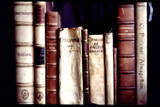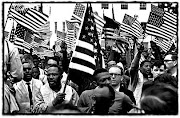 Old world people born post-Watergate era, in the Go-Go 80's or when Bush the Smarter was president, who now have enough new world electronics per capita to bring down a power grid, are discovering the ancient world of the local library. Thomas Jefferson gave his collection to start the Library of Congress and libraries have been an American staple ever since. The internet was supposed to end the quaint notion of getting a library card, but now, I am not the only one with a card that actually goes into the library and
Old world people born post-Watergate era, in the Go-Go 80's or when Bush the Smarter was president, who now have enough new world electronics per capita to bring down a power grid, are discovering the ancient world of the local library. Thomas Jefferson gave his collection to start the Library of Congress and libraries have been an American staple ever since. The internet was supposed to end the quaint notion of getting a library card, but now, I am not the only one with a card that actually goes into the library and  sees the Dewey decimal system in full gloriously dull Times New Roman type on little white labels on each book and smiles. And the young people going to the library and using it actually return again and again during daylight hours, in big numbers, according to a joint study from Pew Internet/American Life.
sees the Dewey decimal system in full gloriously dull Times New Roman type on little white labels on each book and smiles. And the young people going to the library and using it actually return again and again during daylight hours, in big numbers, according to a joint study from Pew Internet/American Life."The age of books isn't yet over," said Lee Rainie, Pew's director.
The study found that library usage drops gradually as people age -- 62 percent among those 18-30 compared with 32 percent among those 72 an
d up, with a sharp decline just as Americans turn 50.
"It was truly surprising in this survey to find the youngest adults are the heaviest library users," Rainie said. "The notion has taken hold in our culture that these wired-up, heavily gadgeted young folks are swimming in a sea of information and don't need to go to places where information is."
 What's the draw? The working theory is most of these people were in their teens as libraries transformed themselves and powered up with PC's, DVD's and
What's the draw? The working theory is most of these people were in their teens as libraries transformed themselves and powered up with PC's, DVD's and  other modern technologies. Online may give information. But there is a difference if you can hold the book or reference material in your own hand. Answers about medical issues seem to be the biggest initial information quests and then it blossoms. Leading in using the library, Gen Y'ers also realize the library is a great spot in urban settings to snag free WiFi. A fast connection rules! But it is better than being at Starbuck's because there are plenty of electrical outlets at the library to plug into, just no triple lattes or baked snacks at the Librarian's information counter.
other modern technologies. Online may give information. But there is a difference if you can hold the book or reference material in your own hand. Answers about medical issues seem to be the biggest initial information quests and then it blossoms. Leading in using the library, Gen Y'ers also realize the library is a great spot in urban settings to snag free WiFi. A fast connection rules! But it is better than being at Starbuck's because there are plenty of electrical outlets at the library to plug into, just no triple lattes or baked snacks at the Librarian's information counter."These findings turn our thinking about libraries upside down," said Leigh Estabrook, a professor emerita at the University of Illinois and co-author of a
report on the survey results.
"Internet use seems to create an information hunger and it is information-savvy young people who are most likely to visit libraries," she said.
Sixty-five percent of them looked up information on the Internet while 62 percent used computers to check into the library's resources.
Public libraries now offer virtual homework help, special gaming software programs, and some librarians even have created characters in the Second Life virtual world, Estabrook said. Libraries also remain a community hub or gathering place in many neighborhoods, she said.
 The Library of Congress is a masterpiece of architecture created from marble, limestone and one man's foresight. It is a treasure and though only having been in it once, I vow to return. The Library of Congress: The Art and Architecture of the Thomas Jefferson Building, weighing in at a hefty four pounds and with a price tag worthy of that because of the color pictures, simulates the feeling of being in America's grandest library. Henry Hope Reed, John Young Cole and Herbert Small are the editors.
The Library of Congress is a masterpiece of architecture created from marble, limestone and one man's foresight. It is a treasure and though only having been in it once, I vow to return. The Library of Congress: The Art and Architecture of the Thomas Jefferson Building, weighing in at a hefty four pounds and with a price tag worthy of that because of the color pictures, simulates the feeling of being in America's grandest library. Henry Hope Reed, John Young Cole and Herbert Small are the editors.










1 comment:
First of all, as someone that has spent many years working in Public and University libraries, the Dewey decimal system is on its way out. Library of Congress Call Numbers are easier to use and better organized.
Nerd insight aside, I think the state of public libraries are not all that optimistic. Down in Norfolk, Virgina at least, I watched the 'community hub' hand out scratched up DVDs; stained, trashy novels; and access to our computers so kids could check their MySpace pages then play games.
There were fights I had to break up. There was drama I had to quiet down. It was not a learning facility.
The building was there though, and there were a few people that came to find a challenge or to study for their GED or military test. Libraries are what people make them. Sometimes they want movies that you know will stunt a poor child's education. How do you change what people want? Solve that riddle and then I'll hop on the Hooray for Libraries bandwagon.
Post a Comment